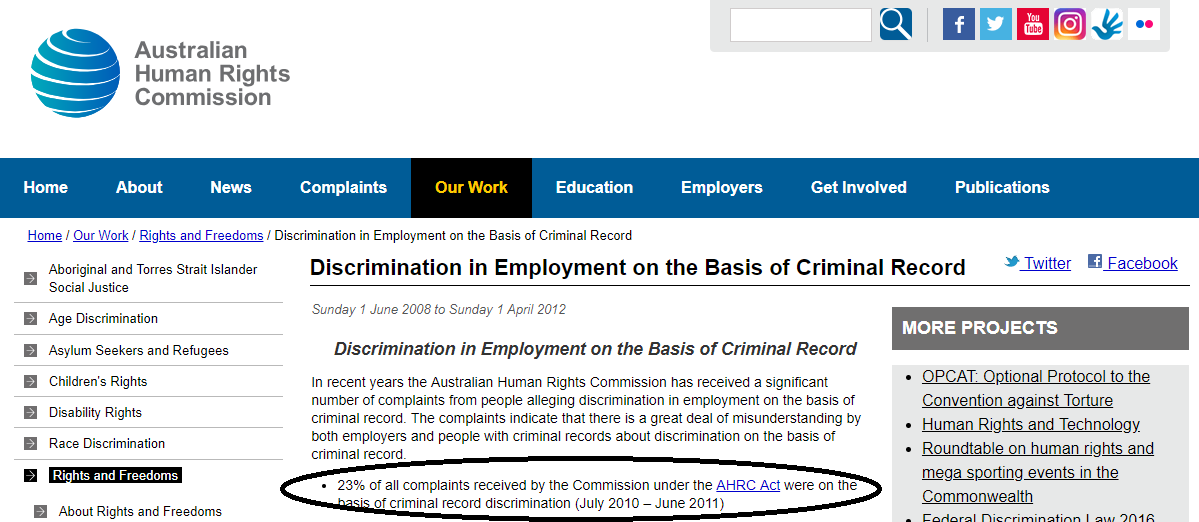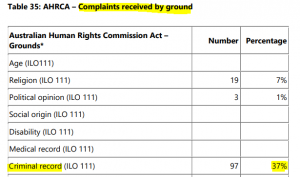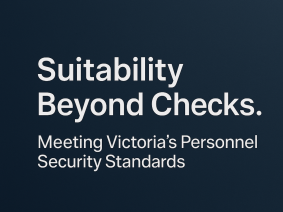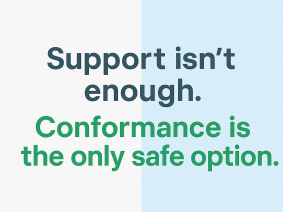1 in 4 Complaints to the Human Rights Commission are due to Criminal Record Discrimination. Are you next?
If you:
Refuse jobs to candidates
Dismiss Employees
Refuse Promotions or Transfers
… and some of the process you use to arrive at those decisions are due to the person’s criminal history, then please read on.
It may not be uncommon for you to obtain consent from the candidate to undergo a National Police Check (NPC) and your professional indemnity insurance company will reward you with a reassuring nod. However, there is a minefield of things worth considering to ensure a stressful legal battle and sort of discrimination claim is not on your horizon:
- The Job Advertisement should clearly state that a pre-employment background check is required for the role. (eg. “Candidates will need to go through a background screen and be awarded a favourable Suitability Qualification.”). If you go just for a basic NPC then you will need to add words like “those people with criminal records will not be automatically barred from applying”
- OK, let’s say that you now have a candidate that would be perfect for the job, but the NPC has come back with a Disclosable Court Outcome (DCO).
- Now you HR Manager or Security Manager must investigate the criminal history past. It can be tricky! As the Humans Rights Commission has stated, you need to consider the following factors:
- the seriousness of the conviction or offence and (as mentioned) its relevance to the job in question
- whether in relation to the offence there was a finding of guilt but without conviction, which indicates a less serious view of the offence by the courts
- the age of the applicant when the offences occurred
- the length of time since the offence occurred
- whether the applicant has a pattern of offences
- the circumstances in which the offence took place, for example if it was an offence that took place in a work, domestic or personal context
- whether the applicant’s circumstances have changed since the offence was committed (for example, past drug use)
- whether the offence has been decriminalised by Parliament or it was an offence overseas but not in Australia
- the attitude of the job applicant to their previous offending behaviour
- references from people who know about the offending history.
Remember, the more information that you ask for, the greater the likelihood that you can exercise reasonable judgement in assessing the connection between the criminal record and the inherent requirements of the job.
However, you should be aware that this extra scrutiny places added pressures on the candidates and who knows if it will end up in court.
On a related tangent, CareerBuilder survey has noted that 51% of employers who researched a candidate’s digital footprint found something that caused them not to hire them. This gives an unsuccessful candidate another basis for a claim that the denial of employment was discriminatory.
How has this played out Australia? In short: A HUMAN RESOURCE (and LEGAL) DISASTER!
In recent years the Australian Human Rights Commission has received a significant number of complaints from people alleging discrimination in employment on the basis of criminal record. The complaints indicate that there is a great deal of misunderstanding by both employers and people with criminal records about discrimination on the basis of criminal record.
23% of all complaints received by the Commission under the AHRC Act were on the basis of criminal record discrimination (July 2010 – June 2011). Read here:

The problem is getting worse. It has moved from 23% to now 37%!
With Cleard.life you can outsource this headache altogether.
We enhance and or improve the way organisations reach background screening determinations. Not only does it step up organisation’s personnel security efforts but it lifts and fortifies the organisation’s security standards. And most importantly, it abides by the Anti-Discrimination Act.
We offer a standalone background vetting check which is recognised as an Employment Background Screening ‘Suitability Assessment’.
Cleard life is a unit of an Australian national security vetting agency leader, Crown Vetting. Through the Home Affairs’ Adjudicative Guidelines, we have democratised vetting to allow organisations to access the same suitability standard checks applied to national security clearances, but a 100-fold faster and a fraction of the cost. The same methodology that government vetting agencies use to determine the suitability of a person to access to HIGHLY SENSITIVE information is now in the hands of HR Professionals, Recruiters, Security Officers, Risk Managers, Business Owners & Employers.
Get in touch with us for a confidential discussion about your situation. Phone (02) 61-71-41-71 today.
View our Product details here.
Or contact us on (02) 61-71-41-71 for a no obligation, confidential discussion.







